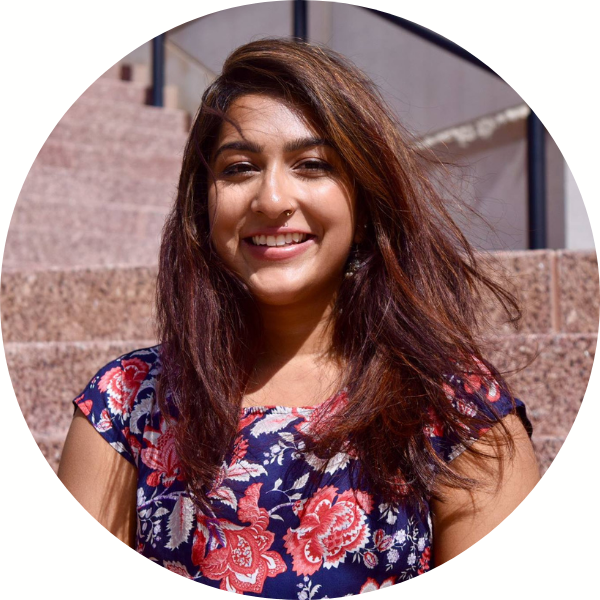Deacon Spotlight: Aishwarya Nagar
Aishwarya Nagar (2016, BS in Biology with minors in Religion and Philosophy)
Research Associate at Iris Group in Chapel Hill, NC
Tell us about your current job role and employer. What are you currently working on?

I work as a researcher for a small women-owned consulting firm, Iris Group, that integrates gender and social inclusion into global health and international development projects. Currently, I’m conducting data analysis and preparing reports for a novel USAID-funded activity that improves menstrual hygiene management and women’s economic empowerment in Kenyan and Nepali workplaces. I’m also wrapping up an effort to fill gaps in global evidence on child, early, and forced marriage. On any given day, I’m supporting our projects through data analysis, preparing reports and presentations for stakeholders, developing communications strategy, designing gender-intentional interventions, and more.
What key personal and/or career experiences led you to where you are today?
I was pre-med at Wake Forest and had fully curated my college experience to lead into medical school. However, it was difficult to balance my interest in the medical field with my personal passions of feminist & social justice advocacy without feeling like I was choosing one over the other. So, when some of my humanities and social sciences classes helped me learn about systems of injustice, power, and social inequalities – especially how they affect our health – I realized that my passions were more aligned with an emerging field: public health.
After graduating, I worked as Wake Forest’s first Fellow for Wake Downtown, which prepared me to be an adaptable and quick-thinking “jack of all trades.” After that, I went to graduate school for my Master’s in Public Health, where I worked several part-time research jobs and completed a maternal & child health-focused practicum in Haiti in tandem with my academic coursework. These experiences proved to be excellent primers for working with complex and nuanced global health issues. One of my professors in graduate school worked at the intersection of gender justice, social justice, and global health, and I immediately knew that that’s what I wanted to do professionally!
What is the most challenging aspect of your job? How do you navigate that challenge?
When I transitioned to my first “real world job,” many of my anxieties were rooted in my status as an international student. It felt challenging to plan for a long-term career when I was constantly worrying about my next step and whether that would mean leaving behind all of my friends, connections, and resources in the US. Unintentionally, it taught me to make the most of every professional and personal opportunity I had and to build strong, authentic networks.
What advice would you give to Wake Forest graduates about developing their personal life habits after college (finances, health, values, work/life balance)?
Learn how to set boundaries. Full disclosure: I am terrible at this! I find it very difficult to not work during evenings, weekends, and even during my paid time off. However, it is very important to learn what your boundaries are, communicate them, and enforce them consistently. We tend to glorify the idea of working beyond our hours and sacrificing our personal lives to work, but this is exactly the kind of thinking that has pushed me to the edge of burn out several times.
We know that relationships are important for any kind of development. How do you build and maintain your network?
I moved to my city a few months before the pandemic, so it has been challenging to make new personal and professional relationships here. I’ve enjoyed staying connected with local alumni, meeting like-minded people while volunteering with mutual aid organizations, attending conferences, and tapping into professional networks locally – as well as the “new normal” of making virtual connections.
Tell us about your mentoring relationships. What impact have these relationships had on your career and life?
Absolutely. My mentors at Wake Forest did everything from counseling me through a problem to helping me explore potential career paths to asking me difficult, introspective questions. Not to mention – they are fantastic people with inspiring passions, interests, and journeys! My mentoring relationships have taught me about the value of building authentic connections with people not only because you want something out of them but, more importantly, because you’re curious about or inspired by them. They have taught me to be vulnerable and ask for help instead of trying to do everything on my own. They have taught me to value people’s lived experiences and to appreciate the diverse ways in which we can grow and learn.
What advice would you give to current Wake Forest students and/or young alumni who are about to start their first professional job?
Don’t put pressure on your first professional job to be “the one.” For many people, career paths are not linear. You may need to do some trial & error, moving around, or trying out new (possibly unexpected) opportunities to figure out what kinds of workplaces, fields, and roles align with your goals, values, and needs.
What’s next for your career? What future goals or plans are you pursuing?
My goal is to continue working at the intersection of gender equality, social inclusion, and international development/ global health. I’ve been networking with people in my field, working my supervisors on opportunities to expand my skill sets, and learning from virtual webinars. In the public health, global health, and international development fields, there is always more learning to do!
Story published in November 2021. For current updates about Aishwarya, visit her LinkedIn page.
